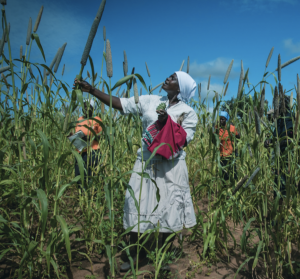Compte-rendu officiel des Concertations pour le Sommet des Nations Unies sur les systèmes alimentaires 2021
Type de Concertation
Coordonnateur
Langue de l'événement de Concertation
Date/heure
À:
Ville
Cible géographique
Format
Veuillez consulter les détails ci-dessous pour obtenir des renseignements sur l’inscription, s’ils sont disponibles, ou communiquer avec le coordonnateur si vous souhaitez y assister.
Animateur
Description
Seeds and Food are intrinsically linked. In a continuous cycle, we grow our food from seeds and we get our seeds from our food. But there is a serious disconnect between the way we produce and consume our food. Those who grow our food are often the most hungry; and a large part of our current food systems perpetuate inequality, create conflict and damage our planet and our well-being.
The climate crisis and the covid pandemic are compelling moments to reflect on how we can act together towards the transformation for healthy, sustainable and equitable food systems. We could choose to foster a respectful and synergistic relation between seeds and food; and between people and the planet.
Andrew Mushita, Food Champion for the UN Food Systems Summit and Executive Director of the Community Technology Development Trust (CTDT) is convening a local, national, regional to global series of dialogues from a Southern African perspective. This is a multi-stakeholder dialogue with small-holder farmers as key stakeholders. The dialogues begin and conclude with the farmers’ perspectives.
The objective is to enable farmers in Zimbabwe to reflect on their experiences and lessons towards achieving seeds security for resilient food systems. They will present their views and discuss with governments, consumers, researchers, retailers, extension agents, civil societies and policy makers. An evidence-based dialogue will focus on how farmers are experiencing and adapting to climate change; and in what ways their seeds access and management can be supported as a basis of food and nutrition security and climate adaptation. The communities will present their views on the role of biodiversity in their dietary diversity and well-being. The outcome of the dialogue will be recommendations for action for the next 10 years towards a transformative agenda on seed diversity at the heart of equitable and sustainable food systems.
A sequence of dialogues will begin at community levels and then at national, regional and global levels, bringing in experiences also from other countries such as Malawi and Zambia.


